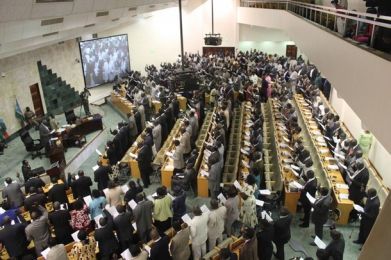S. Sudan parliament passes NGOs bill, gives requirements for relief agencies
May 12, 2015 (JUBA) – South Sudanese Members of Parliament (MPs) on Tuesday passed a Non-governmental Organizations (NGOs) bill, 2015, that will regulate, monitor and require a new registration for NGOs within three months or cease operation in the war torn country.

According to Oliver Mori Benjamin, the deputy chairperson for parliamentary committee for human rights and humanitarian affairs, the bill authorized a government minister to “regulate the work of NGOs” without providing details while presenting the controversial legislation at the fourth and final readings.
“Some of the issues will be addressed by the regulations which shall be issued by the minister as stipulated in section thirty-three of this NGOs Bill, 2015,” Mori told MPs.
Thomas Wani Kundu, parliamentary information chairperson, told reporters that the principles governing the voluntary and humanitarian works are the core components of the bill. Kundu said the bill required NGOs to employ local staff regardless of geographical area, ethnicity, gender and religious beliefs.
“The NGO should ensure that not less than eighty percent of the total number of the staffs employed in the organization are South Sudanese. And I am sure it will be implemented,” said Kundu, speaking about the bill whose copies were not provided to reporters.
He also said NGOs should account to the beneficiaries by making their expenditures public, adding that a new registration is required for all existing and aspiring humanitarians’ agencies.
He directed his remarks to the NGOs, telling them to respect the rules and regulations in the country, saying they were not an island. He accused them of employing foreigners mainly Kenyans and Ugandans at the expense of South Sudanese citizens and threatened not to register them anew unless they corrected the employment policy.
“You [NGOs] cannot be registered because you cannot get cleaners from Kenya to come and work here. You cannot get messengers from Uganda to work here. We have a lot of people here,” he said.
The bill also required that the policy should equally apply at the managerial level in which South Sudanese should control 80% of managerial positions.
Kundu warned that failure by NGOs to comply with the bill particularly on employing nationals in preference to foreigners, after being signed by president Salva Kiir, will have consequences.
“Then above all, respect of the sovereignty of the country. When you are operating, even in your own house, you must respect the rules of that house,” he said adding “but we are not going to dictate the work of NGOs, we are not going to control it but they should work within the law.”
At the reopening of parliament last month, President Salva Kiir told MPs to prioritize NGOs bill during which he explained to the MPs that the bill provided a “legal framework for humanitarian agencies in the country.”
The bill will now be sent to President Kiir to sign it into law.
(ST)
